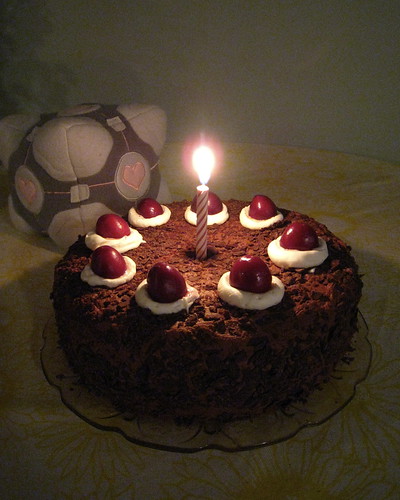Happiness = Perceived Experience - ExpectationsThink about it. I can't name one thing where this isn't true. From the inane (changing lanes in traffic) to the existential (what do I want out of my life?), and everywhere in between (keeping our boss happy!), it fits.
Happiness comes from an experience and how we perceive that experience, with a baseline set by our expectations. The higher our expectations, the more difficult it is to be happy with a situation. Lower expectations will result in the same situation being more pleasurable. But it's not just about managing our expectations… it's also about managing our perception of a situation. What details do we notice or ignore, how do we take it all in?
 |
| The cake is a lie! |
Let's say I got a chocolate cake for my birthday. If I had high expectations (I wanted a 3-layer yellow cake with white frosting and 3 candles delivered as part of a surprise party), then I'm probably unhappy with my chocolate cake. But if I had only expectation of "cake", or even no particular expectation of cake one way or the other, I'm probably pretty happy with my cake. If my expectation was that everyone would forget my birthday and there would be no cake at all, then I was probably delighted by my cake!
Now let's look at the perception of the experience. Did I notice that my friend had a very busy day, and still somehow managed to make time to get my cake ready for me? Wow, what a great friend! I'm delighted with my cake! What about other details of the situation? Maybe my sister is being snarky, and fighting with everyone at the party. If I notice this, even though the cake met my baseline "cake" expectations, I will probably be more unhappy (unless snarky is my sister's default modus operandi, in which case hopefully my expectations were already modulated accordingly).
I stumbled across this idea when reading Steve Seow's work on engineering time, which is around how users perceive duration, timing, and responsiveness. Early in the book, he makes reference to Maister's First Law of Service:
Satisfaction = (Experienced – Expected)This got me thinking. We cannot change the reality of situations, which are our experiences. They are what they are. The only thing we have power over is our own thoughts: our perceptions of the experiences, and our expectations for the situation.
Satisfaction = (Perception – Tolerance)
I don't mean that happiness comes from lying to oneself about what we really want and need. There is a limit to how much we should--or even can--alter our own internal expectations. All I'm saying is that there are ways of seeing things which alter our perception of an experience, and thus alter the happiness we receive from it.
Look at the learning process, and making mistakes. If our expectation is that we should not make mistakes, then learning will necessarily be a painful experience, because mistakes are a necessary part of learning something new. But if instead of bemoaning our mistakes, we look at them from a different point of view, as something we have overcome which has made us better, stronger, wiser and more knowledgeable, then there is a great deal to be thankful for, and even happy about, in every mistake we make.
No comments:
Post a Comment